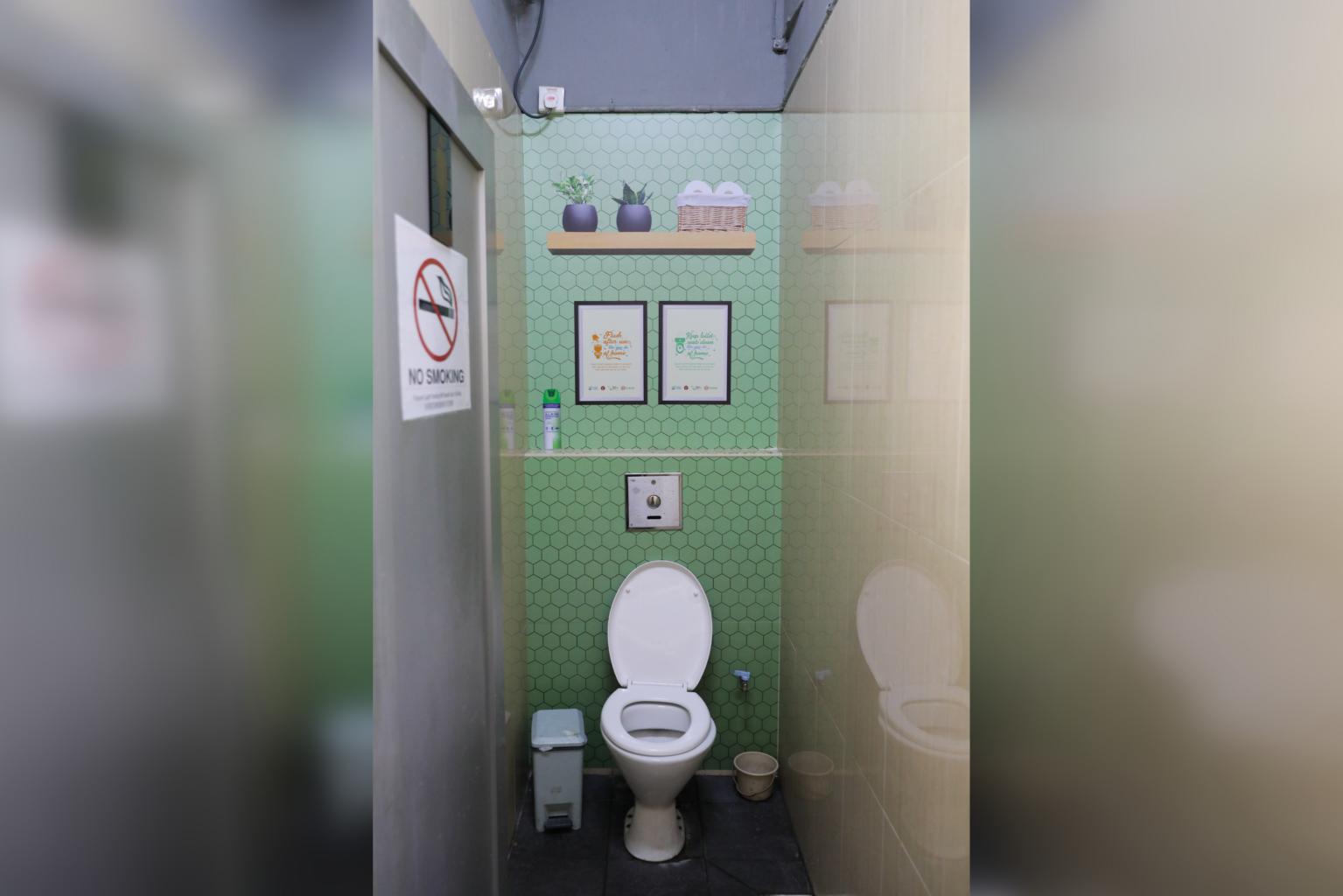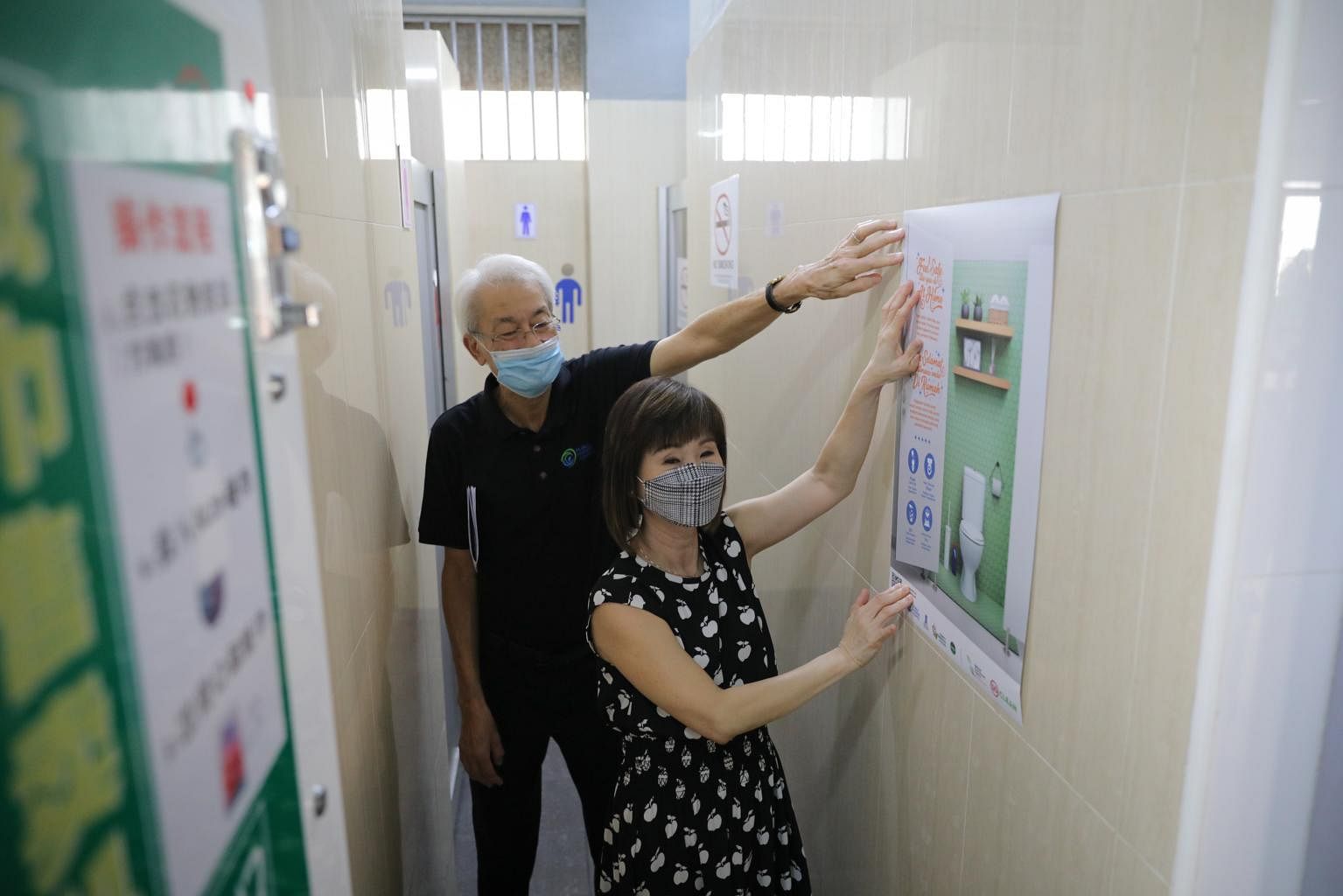Coffee shop toilets decorated to look more 'homely' to encourage cleanliness
Sign up now: Get ST's newsletters delivered to your inbox

The cubicle wraps depicted bathroom tiles and shelves with potted plants.
ST PHOTO: ONG WEE JIN
SINGAPORE - Ten coffee shop toilets have been decorated with posters, cubicle wraps and wall stickers to make it seem more "homely and cosy", to encourage users to keep the toilets clean.
The initiative by the Public Hygiene Council (PHC) was launched on Friday (Nov 19), in conjunction with World Toilet Day, and in support of the National Environment Agency's public toilet cleanliness campaign.
The cubicle wraps depicted bathroom tiles and shelves with potted plants, as well as posters reminding the public to keep toilets clean "like you do at home".
Decoration efforts will be progressively rolled out to 110 other coffee shops by December.
There are about 1,100 coffee shops in Singapore.
Volunteers will also be stationed outside toilets to thank and hand out rewards - a packet of wet wipes - to people who displayed good etiquette, such as flushing the toilet and not flicking water onto the floor after washing their hands. Such people are dubbed SG Clean Heroes.
On Friday, Senior Minister of State for Sustainability and the Environment Amy Khor visited the FoodHub coffee shop at Block 214 Serangoon Avenue 4, which is one of the coffee shops participating in the initiative.
Dr Khor said maintaining high standards of cleanliness and hygiene in public spaces is necessary to curb the spread of diseases such as Covid-19, and urged people to practise social responsibility.
"If these facilities are not clean, viruses and germs can easily spread to the diners; the food could also be contaminated," she added.
"The onus of keeping the toilets clean should not just rest on the coffee shop operator or the cleaners. Even with more regular cleaning scheduled, all you need is just one inconsiderate toilet user, and the toilet will be dirty."
PHC chairman Edward D'Silva said he noticed that pre-pandemic, toilets were getting dirtier over the years.
Common hygiene issues at such toilets include not flushing and people squatting on a sitting toilet.

"Since Covid-19, there is an emphasis on hand washing, but physical cleanliness in toilets did not change. So we came up with initiatives to change the mindsets of both coffee shop operators and the public," he said.
Mr D'Silva said that making coffee shop toilets look nicer would encourage people to be more conscious in keeping it clean "just like their homes".
"We would like to try educating the public first before turning to legislation. But we've observed that legislation is more effective, as seen in the success of enforcing the returning of trays," he added.
Ms Shen Bo, 39, who has been working as a cleaner at the FoodHub coffee shop for two years, said she has seen a difference in how patrons use the toilet since the cubicle wraps were put up about a month ago.
"Before, there would always be people who don't flush the toilet or throw tissue papers on the floor. Now with the posters put up and the toilet looking homely, toilet cleanliness has improved," she said in Mandarin.
A study by the Singapore Management University last year also found that Singapore's toilets had become dirtier since 2016, with coffee shop toilets being deemed significantly dirtier than those in hawker centres.
In a separate scheme to raise cleanliness standards of public toilets, restroom products with "detect, feedback, eliminate and clean" smart features will be certified for the first time under the Singapore Green Building Product certification scheme.
Sensors can detect defects or situations such as abnormal water usage, ammonia or high people traffic so that maintenance can be done in a timely manner.
Interactive feedback systems can also be installed to allow people to give feedback on any defects, dirty toilets or depleted supplies of hand soap, for instance.
Other smart solutions include antibacterial coatings on tiles to eliminate bacteria upon contact, and energy saving fast-drying hand dryers.


